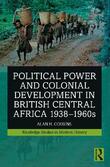Sökning: onr:4lr836m1296dcq4w > Political power and...
- 1 av 1
- Föregående post
- Nästa post
- Till träfflistan
Political power and colonial development in British Central Africa 1938-1960s / Alan H. Cousins.
- Cousins, Alan H. (författare)
- ISBN 9781032320250
- Publicerad: New York, NY ; Routledge, 2023
- Copyright: ©2023
- Engelska xix, 247 pages
- Serie: Routledge studies in modern history
- Bok
Innehållsförteckning
Sammanfattning
Ämnesord
Inställningar
Hjälp
Stäng
- 1. ‘Inheritance from the Past and Legacy to the Future’: Themes and Concepts?-- 2. Background to Development Policies in Nyasaland and Northern Rhodesia, and the Road to Federation -- 3. White Ethnicity, Power and Development in Northern Rhodesia, 1938-1960s -- 4. ‘A White Man's Country’? Europeans, Politics and Race in Northern Rhodesia, 1938-1960s -- ?5. Food, Land and Labour: Agricultural Development and Policies in Nyasaland, 1938-1961 -- 6. Realities of ‘What Lies Ahead’: African Politics and Development Policies in Nyasaland to the 1960s -- 7. Conclusion - From Colonial Rule in 1938 to Independence in the 1960s.
- This book focuses on the late colonial history of Zambia and Malawi, which between 1953 and 1963 were part of the Federation of Rhodesia and Nyasaland. Although there were many links in their history and between their populations, the two territories (British protectorates under Colonial Office control) contrasted greatly in power structures, in their economies, and in their development. Europeans living in Northern Rhodesia, with a power base in the mining economy, were able to establish a dominant position in the territory after the Second World War. By the 1950s it looked as though they would have, with Southern Rhodesian Europeans, a long hegemony, gaining independence from Britain as a new Dominion, which would mean control over both Northern Rhodesia and Nyasaland through the Federation. Thus, white ethnicity and ideology are essential factors in this book relating to the struggle for power from just before the Second World War up to the 1960s. However, crises in 1959 and 1960 led to the collapse of the Federation. A second focus is on issues of social and economic development. For Africans in Nyasaland, and in rural parts of Northern Rhodesia, there was a relatively weak economy in this period, a pattern of limited cash crop production, while many people became caught up in labour migration, subordinate to powerful European-dominated economic forces within southern Africa. This meant that colonial policies aimed at rural development were fundamentally flawed. The book also looks at the actual nature of rural economic change (as opposed to colonial policies) and discusses alternative visions of the future which were put forward. The argument is put that historians have often concentrated on the activities of the main nationalist movements in Nyasaland and Northern Rhodesia, seeing them as bringing progress away from colonialism and towards independence. Here there is an attempt to draw out the complexities of life, and a variety of responses in the colonial situation, progress coming in a number of forms, but not always being achieved.
Ämnesord
- Landsbygdsutveckling (sao)
- Politiska förhållanden (sao)
- Historia (sao)
- Ekonomiska förhållanden (sao)
- Vita personer (sao)
- White people -- Rhodesia and Nyasaland -- Economic conditions. (LCSH)
- Rural development -- Rhodesia and Nyasaland. (LCSH)
- Rural development (LCSH)
- White people (LCSH)
- History (LCSH)
- Zimbabwe (sao)
- Malawi (sao)
- Zambia (sao)
- Afrika (sao)
- Rhodesia and Nyasaland -- Politics and government. (LCSH)
- Zambia -- History -- 1953-1964. (LCSH)
- Malawi -- History -- 1953-1964. (LCSH)
- 1900-talet (sao)
Klassifikation
- 968.903 (DDC)
- Kpec (kssb/8 (machine generated))
Titeln finns på 2 bibliotek.
Bibliotek i Mellansverige (1)
Ange som favorit- Nordiska Afrikainstitutets bibliotek, Biblioteket (Afr)Ange som favorit
- Titeln i bibliotekets lokala katalog
-
- Placering: Central Africa 23/211
Bibliotek i västra Sverige (1)
Ange som favorit- Göteborgs universitetsbibliotek Humanistiska biblioteket (G)Ange som favorit
- Titeln i bibliotekets lokala katalogFind@GU
-
- Placering: 900 23/85
- 1 av 1
- Föregående post
- Nästa post
- Till träfflistan
Kungliga biblioteket hanterar dina personuppgifter i enlighet med EU:s dataskyddsförordning (2018), GDPR. Läs mer om hur det funkar här.
Så här hanterar KB dina uppgifter vid användning av denna tjänst.
Copyright © LIBRIS - Nationella bibliotekssystem

